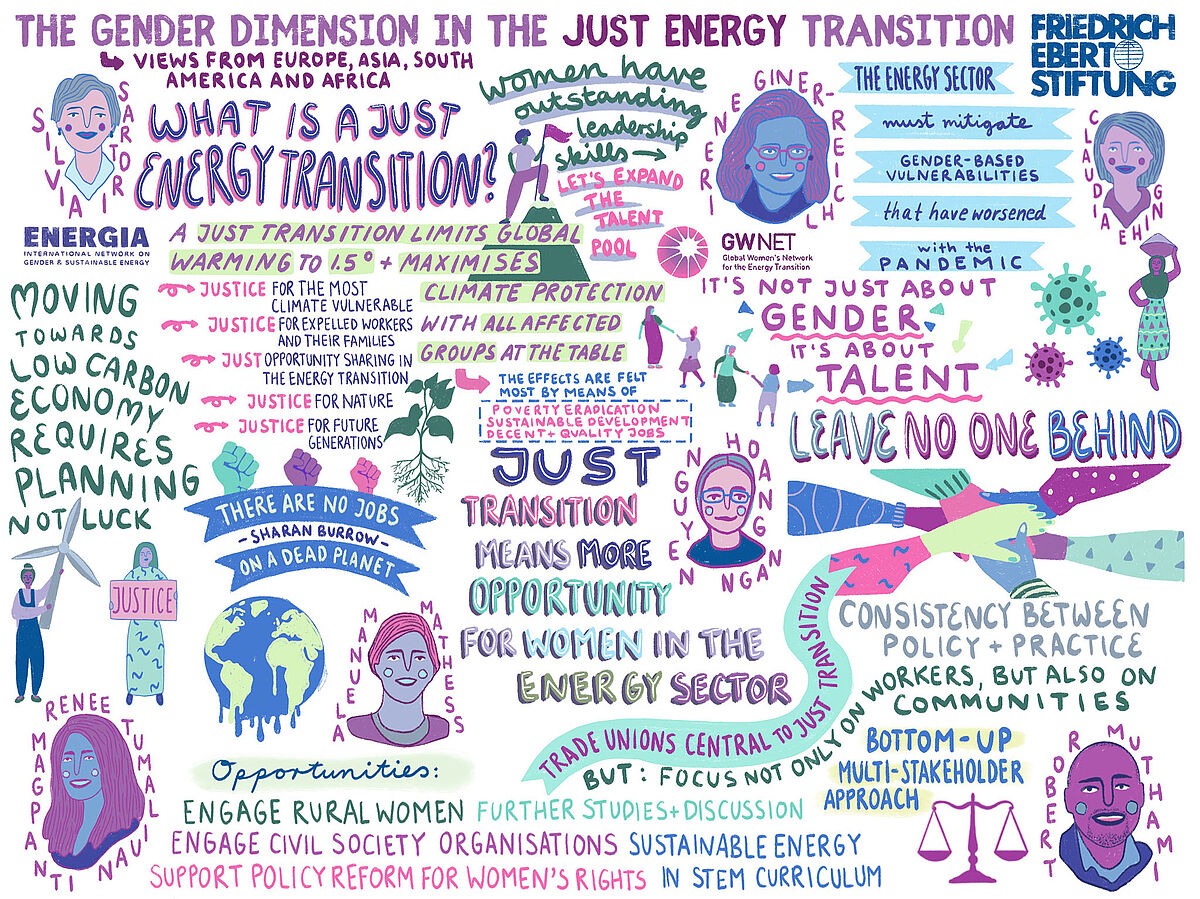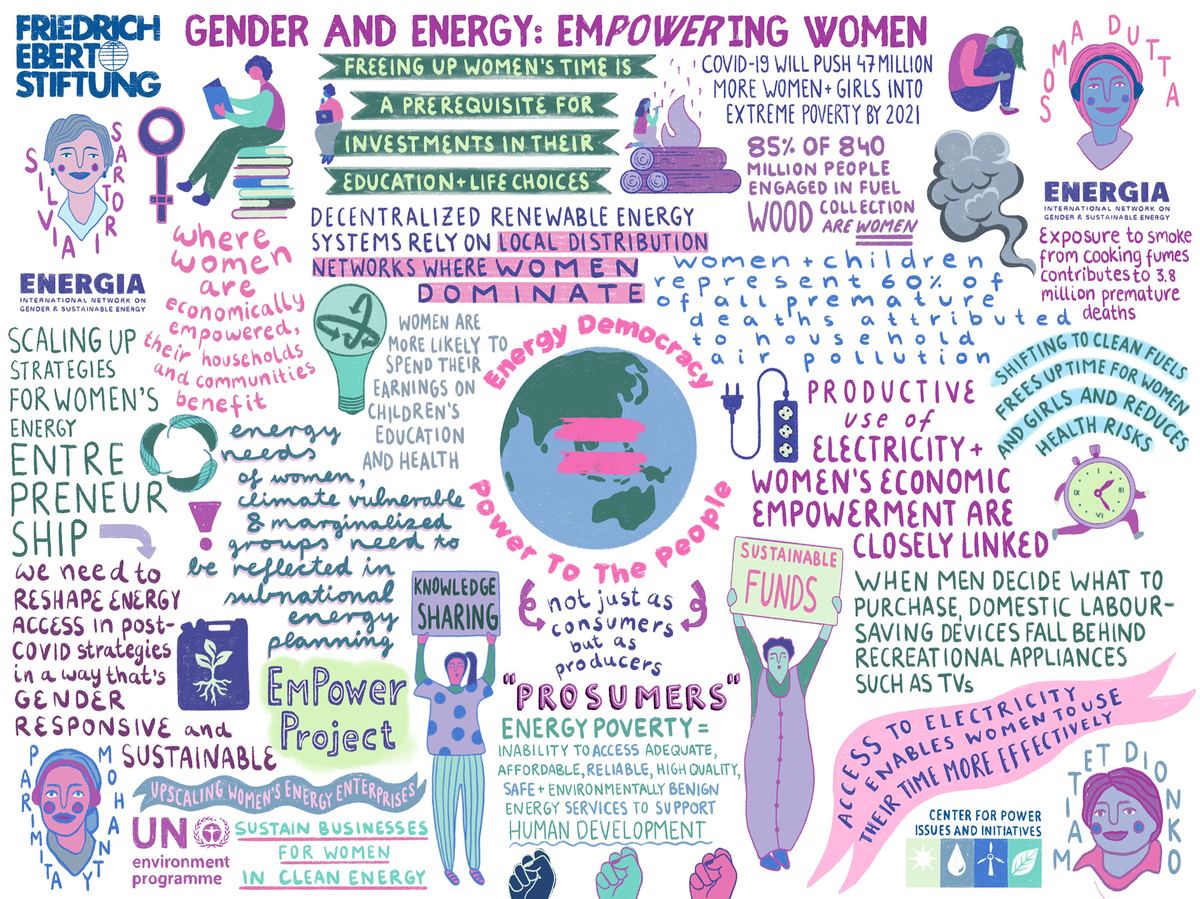Further steps are needed to ensure a gender-just energy transition

Climate change impacts men and women differently. As the main caretakers of families and households, and providers of food security in many developing countries, girls and women are bearing the heaviest burden of the effects of climate change. They are often employed in more climate-sensitive sectors, especially subsistence agriculture. And the resources they are often tasked with procuring, such as food, water and energy, are becoming scarcer.
In addition, climate change aggravates existing inequalities in decision-making and access to resources, particularly energy. While access to energy is widening, it is not yet reaching everyone. Girls and women remain the most affected by energy poverty, which causes them to spend growing amounts of time in procuring energy sources, thus disinvesting that time from education and paid employment opportunities. Additionally, limited access to clean and safe energy makes them and children the most exposed to life-threatening health hazards, most notably in the case of biomass cookstoves.
As the climate crisis advances, a social-ecological transformation and, with this, a transition away from fossil fuels towards renewable energies is becoming increasingly imperative. For this energy shift to be genuinely sustainable on both the environmental and social levels, it needs to be just, so as to leave no one behind during the process. Such a just transition, in limiting global warming to 1.5 degrees as per the Paris Agreement, will help ensure that the needs and rights of different stakeholders, among them girls and women, are taken into consideration and duly acknowledged in designing and implementing the resulting new social, political, environmental and business models.
Addressing the gender-justice component of the energy transition will require a response to existing gaps and inequalities in access to clean energy, education, labour market, policy-making, rights and freedoms. As such, a just transition supports the overarching energy transition by ensuring it is conducted with a gender lens whereby needs, rights and talents of all genders are accounted for.
In these terms, a just energy transition is not solely a strategy to contain or minimize the negative repercussions of climate change or climate change policies. It is also about taking this shift as an opportunity to address current gaps and inequalities. Beyond switching to renewables, a just energy transition requires changing consumption patterns, social practices, behaviours, investments and regulations. It is therefore much more than just switching from one fuel to another.
Understood in this broader sense, a just transition can bring multiple benefits: While pursuing its climate goals, it concurrently contributes to the achievement of the Sustainable Development Goals (SDGs) as in poverty eradication, gender equality, decent jobs, sustainable livelihoods, intergenerational justice, women’s empowerment and improved governance altogether.
Gender justice is indeed more than a matter of human rights and social justice: Gender equality benefits societies – and economies – as a whole. Research data show that “in a full-potential scenario in which women play an identical role in labour markets to men’s, as much as USD 28 trillion, or 26%, could be added to global annual GDP in 2025.”

Removing barriers to women’s inclusion would unlock a potential that remains still largely untapped. For instance, in 2018, women held only 32 percent of jobs in the renewable energy sector. Enabling more women to play a role in this sector would enhance talent acquisition for the industry at large. Equally, supporting women’s entrepreneurship, in this and other sectors, would make economies and societies more inclusive and resilient. To that end, it is critical to support women’s access to finance, enhance their education opportunities, change discriminatory laws, formalize informal jobs, create networking opportunities and engage all stakeholders.
This latter is a critical component of the just energy transition itself. As an approach that frames climate actions in a broader paradigm where all social implications of an energy transition are integrated, including employment and decent livelihoods, the just energy transition inclusively engages all relevant stakeholders: from policy-makers to trade unions, from civil society to business, from the youth to women groups.
Between August and October 2020, the FES Regional Climate & Energy Project in Asia coordinated a series of web-seminars on the nexus between gender and energy for FES country offices in and their partners in the region. The series addressed multiple dimensions, in particular the relationship between gender and climate change, the relevance of gender in sustainable urbanization, the gendered aspects of energy and the gender component of a just energy transition. Keynote speakers included members of ENERGIA International Network on Gender and Sustainable Energy and other experts in the gender and climate and energy field.

About the Author
Silvia Sartori is a Technical Advisor at the ENERGIA International Network on Gender and Sustainable Energy.
About FES Connect
Connecting people, in the spirit of social democracy, we source and share content in English from the German and international network of the Friedrich-Ebert-Stiftung.




